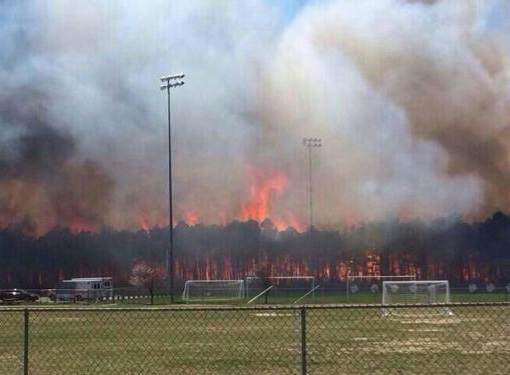
Wildfire in Ocean County, NJ, in April 2014. Source: NJ State Climatologist Office
Farmers, forest landowners and other natural resource managers, whose livelihoods depend on the reliability of seasonal cycles, are on the forefront of climate change. When anticipated local conditions are disrupted, conventional practices no longer suffice and land managers have to tread new ground.
There’s assistance, however, in the Northeast region of the U.S. in the form of the USDA Northeast Climate Hub, which will deliver science-based knowledge and practical information to farmers and forest landowners. The aim of the hub is to support decision-making related to climate change and to maintain and strengthen agricultural production, natural resource management and rural economic development under increasing climate variability. It will build capacity within USDA to deliver information and guidance on technologies and risk management practices at regional and local scales.
The New Jersey Agricultural Experiment Station and Rutgers Cooperative Extension have been invited to participate in this regional collaboration and to provide a point-of-contact between New Jersey’s land-grant university and other institutions within the Northeast Region, and ultimately with institutions throughout the U.S. to accomplish collaborative goals. The university’s participation in the Northeast Climate Hub, which is one of seven regional USDA climate hubs for risk adaptation and mitigation to climate change in the U.S., with be managed by the Rutgers Climate Institute (RCI).

Marjorie Kaplan
Marjorie Kaplan, associate director of RCI, will serve as the Rutgers liaison with Northeast Region Hub administrators and other institutional collaborators. Kaplan’s work as a principal investigator on the Kresge Foundation grant, The New Jersey Climate Adaptation Alliance: A Model Process for Shared Solutions, is relevant to the goals of the Northeast Climate Hub.
The New Jersey Climate Adaptation Alliance (NJCAA) is a network of business groups, non-governmental organizations, academics and local government representatives that is working to prepare New Jersey sectors, including agriculture and forestry, for climate change. Rutgers facilitates the activities of the alliance through a partnership between the Rutgers Climate Institute and the Edward J. Bloustein School of Planning and Public Policy. Kaplan has been co-leading an intensive stakeholder engagement process including surveys, focus groups and interviews to help inform a public policy process to develop recommendations for climate adaptation preparedness in New Jersey.
As a natural progression building on the groundwork developed by the alliance, Kaplan is enthusiastic about Rutgers’ role in the USDA Northeast Climate Hub. “Rutgers is thrilled to be a conduit of information between the Climate Hub and the agriculture and forestry community in New Jersey affected by a changing climate.”
“We have been working with New Jersey stakeholders in our facilitation of the New Jersey Climate Adaptation Alliance to identify climate vulnerabilities of concern to them so we can develop tools, resources and research most salient to addressing climate adaptation in New Jersey. We look forward to sharing not only what we have learned with our partners in the regional hub, but also leveraging regional expertise to better prepare New Jersey agriculture for a changing climate,” she added.

